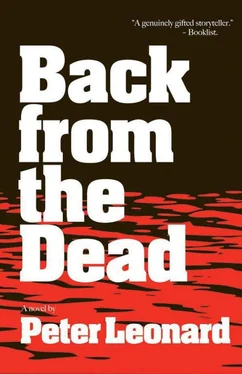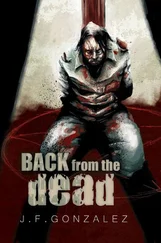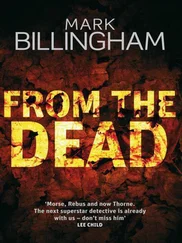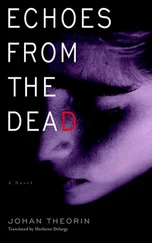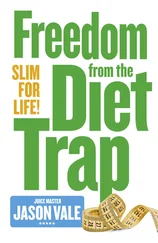“What’re you doing out here middle of the night?” the policeman said, southern accent. He moved to the Chrysler and aimed the flashlight beam in the trunk. Hess put his hand behind his back, felt the handle of the .38 under his shirttail.
“What’d you dump?”
Hess said, “I couldn’t sleep so I decided to take a drive.”
The policeman moved toward the water, shined the light where Zeller had gone under. “Got some ID?”
“In the car,” Hess said.
“Get it.”
Hess could feel the man behind him as he walked to the Chrysler and opened the passenger door. The dome light came on. He reached in, picked up Max’s billfold, opened it and handed the driver’s license to him. The policeman looked at the license and back at Hess.
“You’re a long way from Pompano. I’m going to ask you one more time. You don’t have an answer I like, I’m gonna take you in.”
The policeman was big, the tan uniform tight across his chest and shoulders, revolver in a black holster on his hip.
“You dumped something in the lake is what I think. Now you better start talking.”
“My dog died,” Hess said in a burst of inspiration.
“What kinda dog?”
“A dachshund.”
“A what?”
“Little dog with a long body and short legs.”
“Looks like a sausage.”
“Exactly.”
“What’d it die of?”
“I don’t know but Fonzie was almost fifteen.”
“Well there you go. That’s a long goddamn life for a dog. My Doberman, Pepper, passed at thirteen.” The policeman shook his head. “Why’d you throw it in the lake?”
“I was upset, I wasn’t thinking clearly.”
“I’m sorry for you, buddy. It’s a sad day man loses his best bud. You take her easy and keep it between the ditches. Next time bury it like a normal person, okay?”
Hess closed the trunk and got in behind the wheel. The policeman, still standing next to the Chrysler, waved. Hess turned the key, heard the engine rev, backed away from the police car and made a U-turn. He was calm, steady, thinking you never knew what was going to happen in a situation. He had been ready to pull the .38 a couple of times, sure his only way out was to shoot the man.
Joyce could see cars zipping along on the turnpike in the distance. She and Cordell had adjoining rooms at a Howard Johnson’s Motor Lodge, which Cordell had said was safe.
Joyce had said, “Compared to what, your apartment?”
“Colombians got what they wanted. They’re not gonna be comin’ back.”
“I’m not worried about Colombians, I’m worried about Ernst Hess.”
“You seen him on the floor with a hole in his chest and blood everywhere,” Cordell said. “Man’s still alive he a vampire.”
“A Palm Beach detective told me he was picked up by a fisherman in the Bahamas.”
“Bahamas is like seventy miles away. How you think he got there, the backstroke?”
Joyce said, “The same man escaped from a hospital in Freeport, hijacked a boat in Port Lucaya, left the owner and his wife stranded on a remote island, and headed for the Florida coast. That night he strangled a woman in her house in Palm Beach. The police say the prints they found in the dead woman’s house match the prints they found on the security guard’s car, gun and flashlight, and the prints found at my friend Lenore Deutsch’s house. I know you don’t believe me but I’m telling you I saw Hess in the lobby of my building earlier tonight.”
Cordell said, “Why don’t you think I believe you?”
“Maybe it’s that look on your face, that grin you can’t hide.” Joyce walked over, put the chain on the door, and wedged a chair under the door handle, a security precaution she had seen in a movie.
“Anyone try to get in, I be on the motherfucker,” Cordell said, pulling the gun he referred to as his nickel-plate.
They kept the doors between the rooms open, and Joyce had to admit, knowing Cordell was right there put her at ease.
Early the next morning he popped his head in her room, said he had to take care of some business. “You be okay? I’ll check on you in a while.”
Joyce, still in bed, yawned and said, “See you later.” Thinking he’d be back reasonably soon. She heard his door close and saw him walk by the window. Joyce locked the door between their rooms and called her office. Told Amy, the office manager, her aunt died. She was going to Baltimore to sit shiva.
Joyce showered, dressed and had breakfast in the motel restaurant, first looking out the window from the second floor, scanning cars in the parking lot, looking for Hess. Over cereal and fruit and coffee she paged through the Palm Beach Post. There was another article about the woman murdered in Palm Beach a few days before. This time there was an accompanying passport photograph of the suspected murderer. The article referred to him as Gerd Klaus. But it was Hess. The article went on to say he was considered armed and dangerous. Anyone with information about this man should contact the Palm Beach police immediately.
High-Step was barefoot and Cordell could see the left one was smaller than the right, it didn’t even look like a foot — all mangled and deformed as it was. Cordell didn’t want to look but it was so strange he had to, like looking at the alligator-skin girl at the state fair.
“Hey motherfucker,” High-Step said, “why you lookin’ at my feets?”
“I wasn’t,” Cordell said.
“What you mean, you wasn’t? I seen you.”
Cordell said, “Why don’t you put your special shoe on, you’re so sensitive ’bout your foot.”
“Why don’t you go fuck yourself.”
High was pissed about something, that was for sure. “We gonna talk about the Colombians?”
“Why didn’t you kick me in on the second deal? I was involved they never woulda pulled that shit.”
Now they were getting to it. “You made the intro. I took care of you, didn’t I?”
“Then what you doin’ here? You’s here ’cause you need High’s help. Well this time I don’t want no two hundred dollars, I want half.”
“Half. What you been smokin’?”
“It’s called wise-the-fuck-up weed, motherfucker.”
Cordell looked at him and said, “You’re fuckin’ with me, aren’t you?”
“How much you got right now? Nothin’. I’m gonna get the weed back and the money, and for that I want half.”
“How you gonna do that?”
High-Step was from Detroit, had lived on the same street as Cordell and his momma. High made his money selling firearms, assorted pistols and revolvers. One of his homeboys worked in shipping and receiving at the Anniston Army Depot in northeast Alabama, supplied brand new just-out-of-the-crate M16s.
High’s real name was Carlos Bass, seven years older than Cordell, and successful. Never got busted in the Motor City, moved to Miami after the riot in ’67, police coming down hard on black entrepreneurs involved in illegal activities. High had a house in Coconut Grove with a swimming pool in back, and even with his fucked-up foot always had fine-lookin’ poon hangin’ around.
They listened to Motown tracks on the way to Greaser Town, and when they got there, sat in the car, lookin’ up at an apartment building High said was where Alejo and Jhonny stayed.
“What’re we waiting for, man?” Cordell already impatient. “Let’s go talk at him.”
“How you know he in there? And he is, who in there with him? What I’m sayin’, we don’t rush, we take our time, do it right. Now you met Alejo and Jhonny the kid, but they got two others, can’t think of their names. And they all armed. How do I know this, right? Is that what you’re thinkin’?” High lit a cigarette. “I sold them the guns that’s how I know.”
Читать дальше
